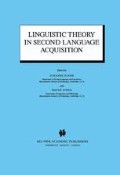Abstract
Traditionally, researchers in the field of pidgin and creole languages have expounded the simplification theory, one which views a pidgin development as being a simplified version of the colonizer’s language. Research by Coelho (1880), Robert Hall (1966), Naro (1971 and elsewhere), and Bickerton (1977), for instance, cite the lack of number and gender marking, and a noninflected verbal system, among other examples, as evidence supporting the simplification hypothesis. The absence of these “marked features” is often used as a kind of yardstick to substantiate the notion that pidgin is a reduced, “hybridized and unstable linguistic system.”
Access this chapter
Tax calculation will be finalised at checkout
Purchases are for personal use only
Preview
Unable to display preview. Download preview PDF.
References
Bailey, C-J. (1974). “Some suggestions for Greater Consensus in Creole Terminology.” In DeCamp and Hancock (1974).
Bickerton, D. (1977). “Pidginization and creolization: language acquisition and universals.” In Valdman (ed.), Pidgin and Creole Linguistics Bloomington: Indiana University Press.
Bickerton, D. (1981). The Roots of Language Ann Arbor. MI: Karoma Press.
Bickerton, D. (1984). “Learnabiliry and the Structure of Parameters.” Lecture delivered at the University of Massachusetts at Boston on November 26.
Chomsky, N. (1981). Lectures on Government and Binding—The Pisa Lectures Dordrecht: Foris.
Coelho, A. (1880). “Os Dialectos Romanicos ou Neo-Latinos na Africa, Asia e America”. Boletim da Sociedade de Geografia I:2 Serie n. 3. 129–96.
DeCamp and Hancock, eds. (1974). Pidgins and Creoles: Current Trends and Prospects Washington, DC: Georgetown University Press.
D’Introno, F. (1982). “Teoría Linguística, Variacion Paramétrica y Espanol de América.” Unpublished Ms., University of Massachusetts at Amherst.
D’Introno, F. (forthcoming). “Clausulas relativas en el espanol de Caracas.”
Eckman, F. (1977). “Markedness and the contrastive analysis hypothesis.” Language Learning 27.2, 315–30.
Hale, K. (1973). “Current trends in linguistics.” In Sebeok (ed.), Diachronic, Areal, and Typological Linguistics The Hague: Mouton.
Hall, R. (1966). Pidgin and Creole Languages Ithaca: Cornell University Press.
Higginbotham, J. (1982). “Noam Chomsky’s linguistics theory.” Social Research 49(1), 143–57.
Kay, P. and G. Sankoff (1974). “A language-universals approach.” In DeCamp and Hancock (1974).
Lefebvre, C. (1984). “Lexical and syntactic borrowing in the Quechua-Spanish community.” Paper presented at the Seventh Symposium on Spanish and Portuguese Bilingualism. SUNY at Buffalo.
Naro, A. (1971). “The origin of West African Pidgin.” Papers from the Ninth Regional Meeting. Chicago Linguistic Society, 442–49. (Reprinted in Sociolinguistics Newsletter 5, 8–11, 1974.)
Pinker, S. (1984). Learnability and Language Development Cambridge. MA: Harvard University Press.
Wexler, K. and P. Culicover (1980). Formal Principles of Language Acquisition Cambridge. MA: MIT Press.
Author information
Authors and Affiliations
Editor information
Editors and Affiliations
Rights and permissions
Copyright information
© 1988 Kluwer Academic Publishers
About this chapter
Cite this chapter
Macedo, D.P., D’Introno, F. (1988). Pidginization as Language Acquisition. In: Flynn, S., O’Neil, W. (eds) Linguistic Theory in Second Language Acquisition. Studies in Theoretical Psycholinguistics, vol 8. Springer, Dordrecht. https://doi.org/10.1007/978-94-009-2733-9_18
Download citation
DOI: https://doi.org/10.1007/978-94-009-2733-9_18
Publisher Name: Springer, Dordrecht
Print ISBN: 978-1-55608-085-2
Online ISBN: 978-94-009-2733-9
eBook Packages: Springer Book Archive

